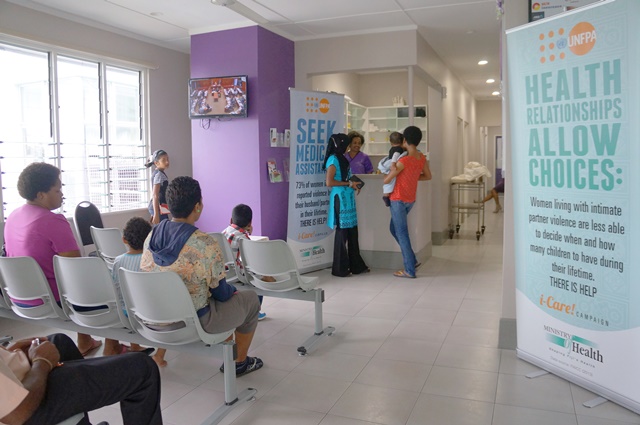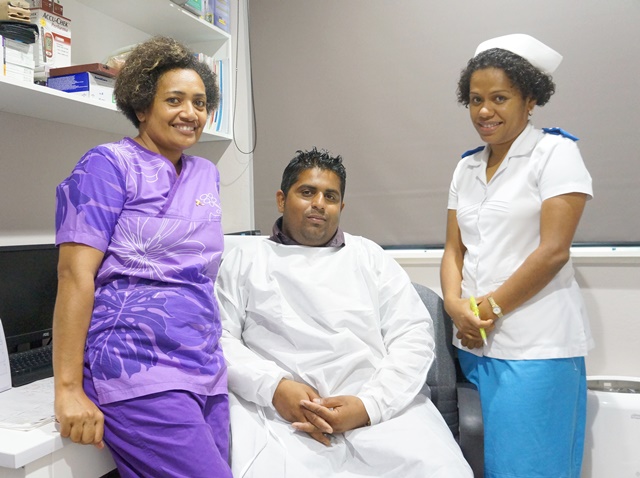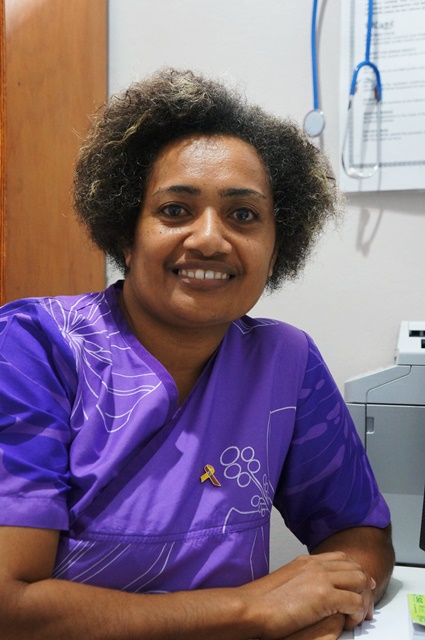THE banter is typical of a young couple, they are comfortable in their space and if not for the fact that we were sitting in a health facility, one could have easily assumed all was well in their bubble - the reasons that brought them together in matrimony were still very much a huge part of their lives.
She confided her menses hadn't stopped for over a month and they were back at the Wellness Centre for Women at the Colonial War Memorial Hospital compound in Suva for results of medical tests earlier conducted.
They decline a photograph and asked to remain anonymous. He's left work to be with her. "I have to make sure she takes her tablets," he says in jest but she responds seriously: "Yes, he is very supportive like this." They are an example of the increasing number of couples who now visit the centre together.

The Wellness Centre for Women which is the go-to place for sexual and reproductive health issues is staffed with only two nurses and one doctor, serving an average of 60 clients a day. Formerly a national referral centre on family planning options, the centre was recently regraded to a divisional (Central-Eastern) facility though clients continue to come from outside Suva.
Acting sister-in-charge Lice Cawaki has been in the field of sexual and reproductive health and rights (SRHR) for 10 years and the one major change she has noticed is the increasing number of men who now come to the clinic with their wives or partners.
The clinic applies an integrated approach in its services which includes counselling for family planning, sexually-transmitted infections and infertility treatment cases, pap smear screening, voluntary confidential counselling and testing, syndrome management and breast examination.
"More people are taking up family planning options and there is an increase in the men who accompany their wives or partners for various reasons. One of them said women go through so much already birthing children and that he just feels for his wife," Cawaki said.
"I always thank men who accompany their wives or partners - some will insist on sitting with their wives during a pap smear. There is also an increase in men who are coming forward for vasectomies. People are now a lot more informed and aware of reproductive health issues."
The socioeconomic burden is one of the most common reasons cited by couples for spacing or ending their child-bearing and for some, they would like to ensure they only have the number of children they can afford in terms ensuring the children reach their full potential in education.
Cawaki says the centre is also seeing a significantly increased number of working mothers requesting family planning options, there is a correlation as well between women who have had higher education and the uptake of contraceptives.
The centre still treats rural-based women who ask for long-term options like jadelle which covers a woman for five years or the intrauterine device (IUD), a decade-long option.
"For those in the rural areas, they come in and ask for long-term options because sometimes the health centres they are close to are out of stock the day they get there, and with transportation issues or the risk of getting pregnant while waiting for new stock, most just make the trip here," Cawaki said.
Cawaki and her staff also have a mobile service, visiting communities and even business houses to provide sexual and reproductive health services for those who may not be able to come to the centre.
One of the recent activities the United Nations Population Fund (UNFPA) Pacific Sub-Regional Office has been involved in is the upskilling of nurses in health facilities outside Suva in reproductive health-related issues including family planning services, working with the Ministry of Health.
The nurses' training allows them to insert or remove jadelle for example, a procedure which only doctors were authorised to carry out. Nurses were also trained to provide related counselling and the provision of other contraceptives.
National reproductive health officer Abdul Hussain confirmed 60 nurses have been trained in this area so far, 15 per divisions. He said the training now ensured access to this reproductive health services at the nursing station levels - nursing stations are manned entirely by nurses. Also with the ministry, UNFPA is supporting the establishment of a similar wellness centre in Lautoka.
"The training has also encouraged a shift in the belief that family planning was just for married couples," Hussain says. "Young single people who are sexually active can access methods of their choice with appropriate counselling and confidentiality is assured for all clients regardless of their status.
A recently released global report by UNFPA and the Guttmacher Institute found across all regions in the world, the greatest burden of ill-health among women and infants was concentrated in places where health systems were weak and services unavailable or inadequate.

The report titled Adding it Up: the costs and benefits of investing in sexual and reproduce health 2014 estimates that sexual and reproductive health services fall well short of needs in developing regions. An estimated 225 million women who want to avoid pregnancy are not using an effective contraceptive method. The sheer volume of population growth has meant the increasing uptake of contraceptives has not made much difference to 2008 Adding it Up figures.
"Investing in sexual and reproductive health is critical for saving lives and reducing ill-heath among women and children. We must ensure their internationally-recognised right to good health is a lived experience," UNFPA Pacific director and representative Dr Laurent Zessler.
The report says if all women who wanted effective contraceptives were able to access it and if all pregnant women and infants received health care of World Health Organisation standards:
* unintended pregnancies would drop by 70 per cent from 74 million to 22 million per year; maternal health would drop by 67 per cent from 290,000 to 96,000;
* new-born deaths would drop by 77 per cent from 2.9 million to 660,000; the burden of disability related to pregnancy and delivery experienced by women and newborns would drop by two thirds; and
* transmission of HIV from mothers to newborns would be nearly eliminated with an estimated 93 per cent reduction to 9000 cases per year.
Today, of the 125 million women in developing countries who give birth every year:
* 54 million do not receive adequate antenatal care;
* 43 million do not deliver in a health facility;
* 21 million women and 33 million newborns do not receive care for medical complications; and
* 550,000 pregnant women living with HIV do not receive treatment to prevent mother to child transmission of HIV.
For every additional dollar invested in contraceptive services alone, $1.47 is saved in maternal and newborn health care.
"The report is a call to action. We have noted the decline in maternal and infant deaths in developing countries but much more needs to be done. Whatever approach governments want to consider addressing this issue, it is critical that we adopt a human rights approach to health care," Dr Zessler said.


